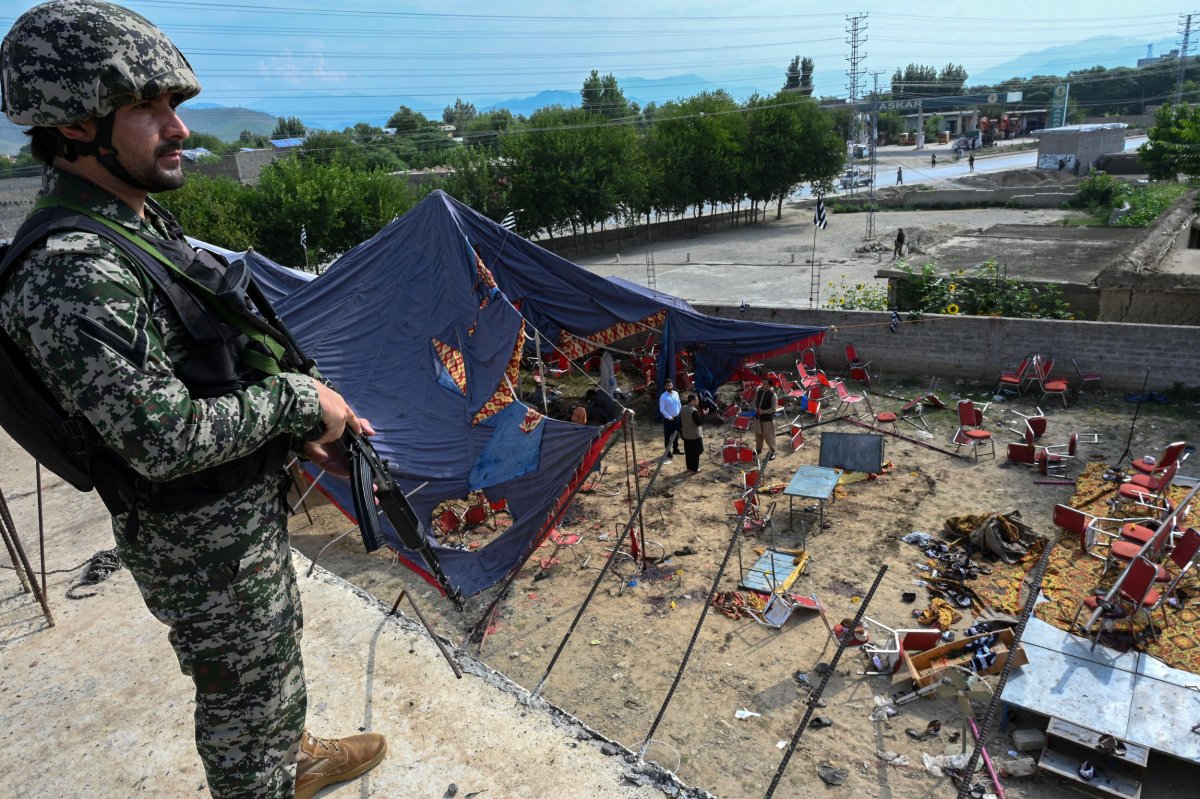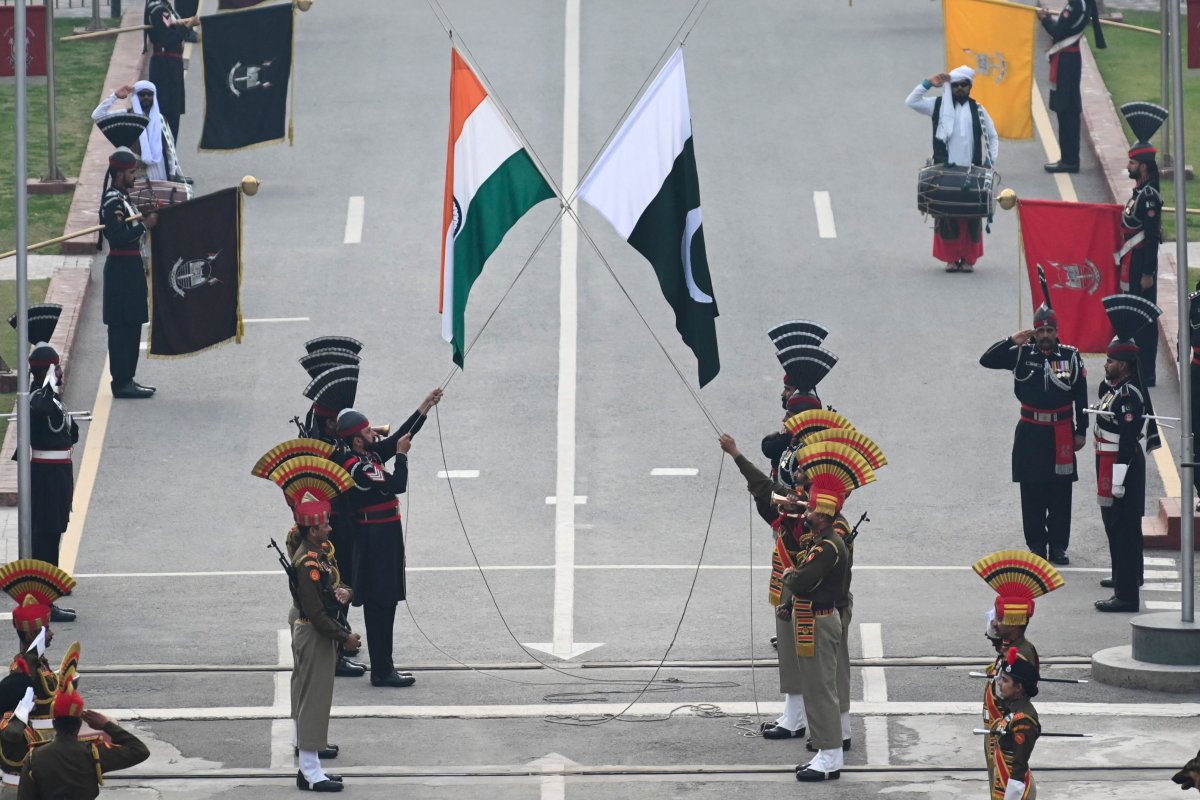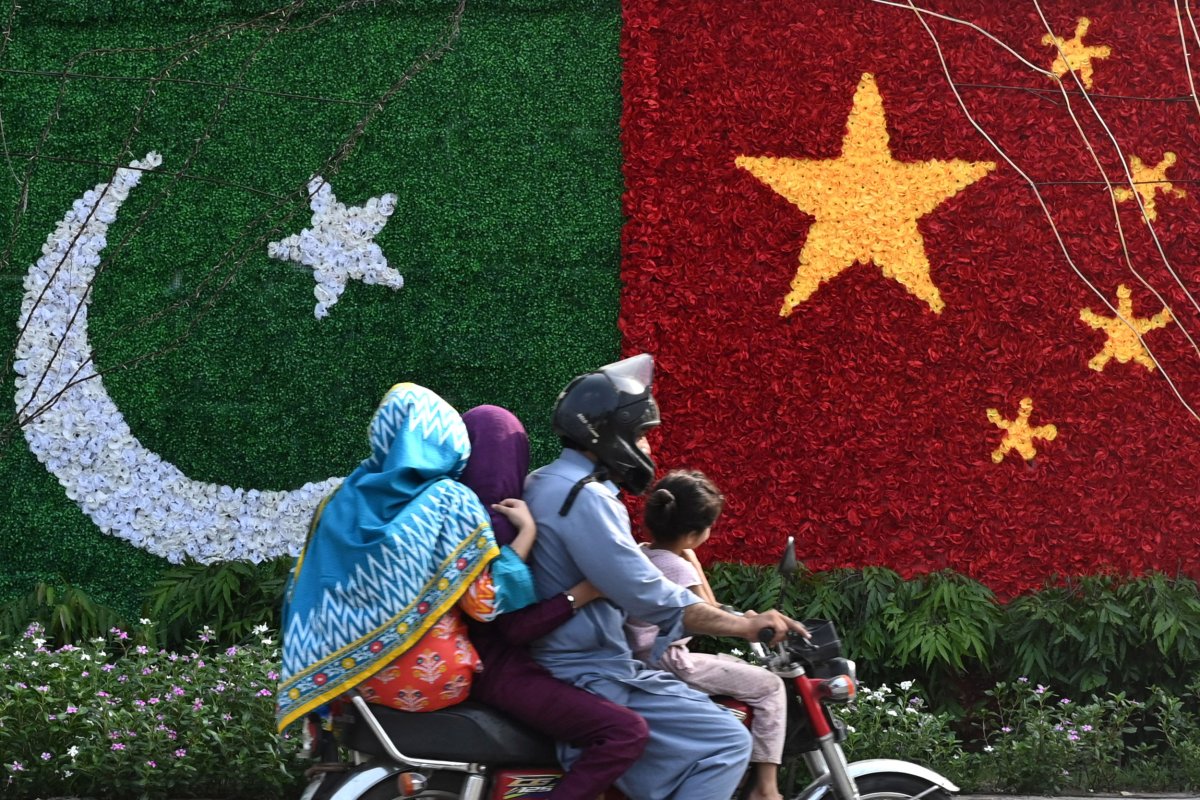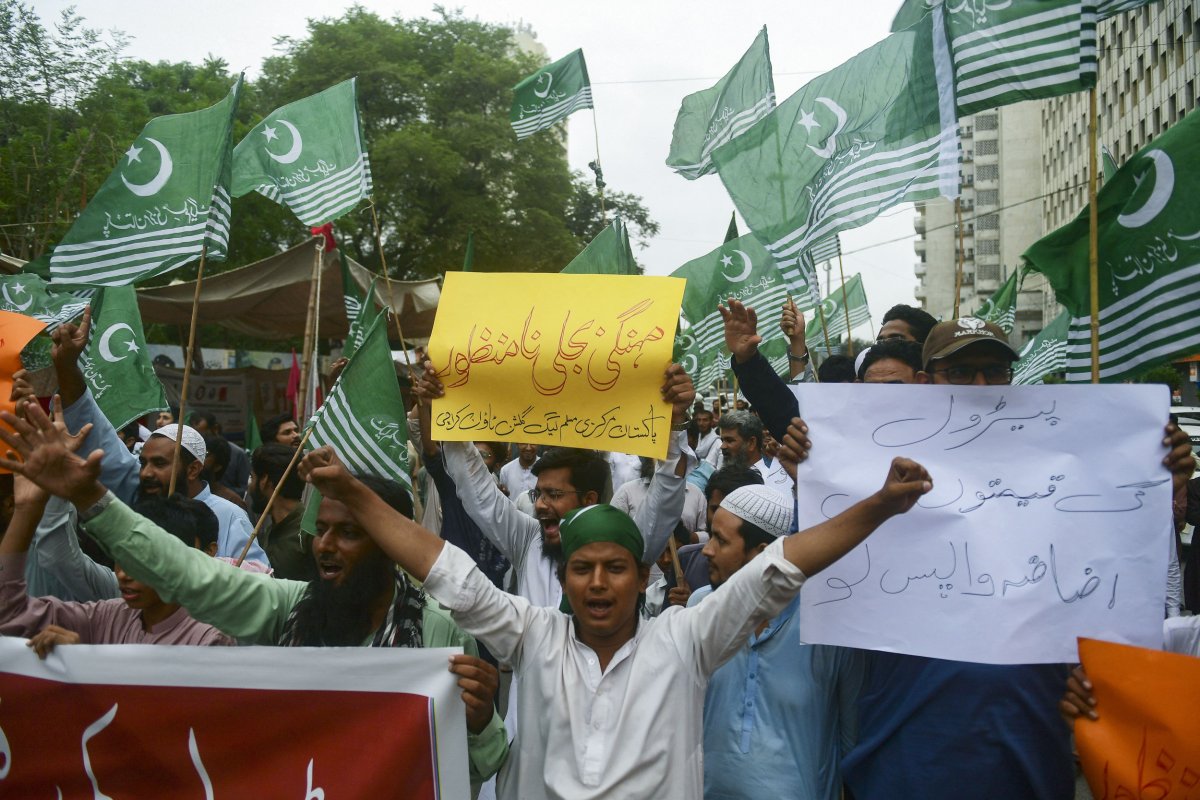As the security situation at the heart of Asia continues to deteriorate over growing militancy and the lingering threats of conflict, Pakistan's ambassador to the United States tells Newsweek that his nation is looking to both Beijing and Washington for support in bringing stability to the region.
While China and the U.S. are locked in a broader geopolitical feud stretching across the globe, Ambassador Masood Khan said that both powers have an interest in not seeing extant risks devolve into a major crisis—a position evident in recent steps taken by the two rivals vis-à-vis the region.
"China's contribution to Pakistan's economic progress has contributed directly and indirectly to stability also," Khan told Newsweek. "At the same time, we have security cooperation with China, we also have defense cooperation with China, and so this is an important relationship."
The ambassador said Pakistan was seeking "an equally robust relationship with the United States."
"After the withdrawal of the United States from Afghanistan, I think we recalibrated our relationship and are using most efficiently the space that is available to the United States and Pakistan for building economic partnerships, for continuing with a paradigm of security cooperation, particularly in regard to countering terrorism and identifying the long-term strategy for strategic stability in the region," he explained.
But stability has proven an elusive goal for Islamabad as it contends with an array of security woes. The recent arrest of ousted former Prime Minister Imran Khan on corruption charges has drawn increased attention to the country's volatility, as his supporters have once again taken to the streets in protest.
Beyond the political drama, however, deeply rooted issues plaguing Pakistan include concerns over the nation's economic prospects, a sharp uptick in militant attacks that include a suicide bombing that killed at least 63 people and wounded more than 100 in the northwest province of Bajaur last week, and the unrelenting risk of an escalation along the disputed border with India.
While Ambassador Khan credited the ceasefire established between the two nuclear-armed nations two years ago with having "saved many lives," he also warned that there remains "a grave risk to peace and security in the region" as long as the dispute over the territory of Kashmir remains unresolved.
"Pakistan and India are nuclear weapons states, and even if they were not nuclear weapons states, these are big nations, with big armed forces and big populations," he argued, "and therefore, peace should be an imperative, not a potential conflict."

Kashmir has served as the primary source of deadly conflict and tension between India and Pakistan since their partition and independence from the United Kingdom 75 years ago. While it's been nearly a quarter of a century since their last war, India-Pakistan dialogue has long been frozen, and a 2019 border skirmish followed by Indian Prime Minister Narendra Modi's decision to revoke India-administered Kashmir's semi-autonomous status has only fueled frictions between the rival neighbors.
Last Tuesday, however, Pakistani Prime Minister Shahbaz Sharif declared he was prepared to resume dialogue with India if New Delhi was prepared "to talk serious matters on the table." Noting Pakistan's nuclear arsenal, he asserted that "war is no longer an option."
The following day, U.S. State Department spokesperson Matthew Miller told reporters that "we support direct dialogue between India and Pakistan on issues of concern."
A U.S. State Department spokesperson reiterated this position to Newsweek and said that "engagement across South Asia continues to be a very high priority for the United States."
"We work closely with our partners in the region on a host of important issues such as upholding a free and open Indo-Pacific, driving innovation, and tackling global challenges as the world emerges from the COVID-19 pandemic," the spokesperson added.
The developments came days after senior U.S. diplomats, led by special representative Tom West, made inroads on another major issue plaguing the region by participating in the first delegation to speak with senior Taliban officials since the group seized power in Afghanistan two years ago amid a U.S. military withdrawal. Despite Pakistan's close relationship with the Afghan Taliban, the group's takeover of the neighboring country has compounded Islamabad's security woes.
On this point, the State Department spokesperson told Newsweek that the U.S. visit demonstrated how "we are open to continuing a pragmatic dialogue with the Taliban on a range of issues to advance mutual interests, including counternarcotics efforts and combating terrorism, as well as steps intended to promote economic stability and to help the Afghan people through very difficult times."
Recognizing that Pakistan has suffered an estimated 80,000 casualties in a long-running fight against militancy, the spokesperson asserted that "we remain committed to working with Pakistan to address the shared threat posed by terrorist groups throughout the region."
"We support Pakistan's government's efforts to combat terrorism and ensure the safety and security of its citizens in a manner that promotes the rule of law, the protection of human rights and fundamental freedoms, good governance, tolerance, and inclusiveness," the spokesperson added.
Newsweek has reached out to the Taliban-led Afghan Foreign Ministry and the Indian External Affairs Ministry for comment.

Ambassador Khan, for his part, welcomed the U.S. position on both fronts.
"We have always pursued diplomacy with India," he said. "The prime minister of Pakistan has once again made an offer for engagement. The U.S. has also expressed its support for direct dialogue between Pakistan and India on issues of concern. We hope there would be a reciprocal resonance from New Delhi."
On the situation in Afghanistan, he argued that Washington's engagement with the Taliban could be useful in pursuing the shared goal of pushing the Islamic Emirate now approaching its second anniversary in power "to neutralize these terrorist groups," the most prominent of which he mentioned were the Islamic State militant group's Khorasan branch (ISIS-K) and Tehreek-e-Taliban Pakistan (TTP).
"The United States diplomatic engagement is always positive, and we welcome it," Ambassador Khan said. "For the past year and a half, we've had dialogue on all issues related to security cooperation, but also about economic development, climate and energy, health, education."
"So, I think these are parallel tracks, but they also have correlation, because if you have stability in the region, you would be able to work more productively in non-security areas, on the economic dimension," he added. "So, I think we need to have a holistic approach towards peace, security and prosperity in the region."
India, however, views Pakistan at the center of threats related to potential conflict and active insurgencies in the region.
"The current political instability, economic crisis and rising counts of violent incidents in Pakistan are being regularly monitored from a military standpoint," Indian military establishment sources told Newsweek.
"Modernisation of Pakistan Armed forces continues unabated despite the economic woes currently faced by the country," the sources added. "Pakistan has continued its strategy of maintaining and encouraging terrorism to suit its nefarious designs. We have not seen any dismantling of the terror infrastructure and support to terrorism by Pakistan."
The Indian military establishment sources identified several groups alleged to be tied to Pakistan, including Jaish-e-Mohammed, Lashkar-e-Taiba, Al-Badr and the United Jihad Council that New Delhi has accused of serving as an Islamabad-backed umbrella of militant organizations said to be operating in India-administered Kashmir.
And although the Indian military establishment sources also stated that the 2021 ceasefire along the restive Line of Control (LC) between the two nations "is holding and has brought much-needed succor to some extent," the sources also warned that the "Indian Army remains fully prepared to counter all emerging threats."
"While India desires peaceful relations with all its neighbours, it retains the right to respond appropriately and proportionately to any situation created by Pakistan," the Indian military establishment sources said. "It is contingent upon Pakistan to stop orchestrating terrorism and ensure peace across the LC. Indian Army remains prepared to thwart any misadventure both along the LC as also in the hinterland."
Ambassador Khan, who previously served as president of Pakistan-administered Kashmir, officially called Azad Kashmir, outright rejected the notion that Pakistan played any role in aiding and abetting militant groups on either side of the de facto border.
"I want to say very categorically and clearly that there are no militant groups operating in the Indian-occupied Jammu and Kashmir or in Azad Kashmir or from Azad Kashmir," the Pakistani envoy told Newsweek. "That's a myth that India continues to peddle to garner sympathy for itself on the grounds that it is fighting terrorism."
"There is no terrorism there," he added. "In fact, these people are under occupation, and they've been declared against their a federal territory."

Meanwhile, China has doubled down on its backing for Pakistan to avert crisis. In the midst of last week's developments, recently appointed Chinese Vice Premier and special presidential envoy He Lifeng traveled to Islamabad to mark the 10th anniversary of the China-Pakistan Economic Corridor (CPEC), a major node of President Xi Jinping's Belt and Road Initiative of infrastructure projects that spans the globe.
Ambassador Khan said that the entire volume of CPEC projects was set to amount to some $62 billion upon the current cycle's completion in 2030.
Echoing Ambassador Khan's praise for China's role on the security front as well, Chinese Embassy to the United States spokesperson Liu Pengyu outlined Beijing's position on its concerns regarding the rise of militancy near the borders of the People's Republic, whose own citizens have at times been targeted by insurgent attacks in Pakistan.
"At present, international terrorism continues to pose a serious threat to people's security and social stability of all countries," Liu told Newsweek. "Terrorism is the common enemy of all mankind, and combating terrorism is the common responsibility of the international community."
"China firmly opposes all forms of terrorism and firmly supports the governments and people of Afghanistan, Pakistan and other countries in their fight against extremist terrorist forces," he added. "China will continue to maintain close communication and coordination with all parties on combating terrorism and jointly safeguard world peace and tranquility."
Such mechanisms have manifested in the form of the Shanghai Cooperation Organization, a bloc consisting of China, Russia, India and Pakistan along with the Central Asian states of Kazakhstan, Kyrgyzstan, Tajikistan and Uzbekistan, as well as, most recently, Iran.
The group's ministerial in May marked the first visit by a top Pakistani diplomat to India in 12 years. Counterterrorism initiatives were also a leading topic of discussion when the nine nations' heads of states gathered virtually last month. The meetings served not only to bring officials from India and Pakistan together, but also China and India, who are embroiled in their own bitter border dispute that has occasionally turned violent.
A number of prominent voices in Pakistan have specifically praised Beijing's role in supporting Islamabad.
Noting the recent CPEC anniversary and the senior Chinese diplomat's visit, Sarfraz Nawaz, a former cricket player who went on to serve in the regional Punjab Provincial Assembly, told Newsweek that "China means a lot to Pakistan."
"China is a real old friend of Pakistan and has always helped Pakistan," Nawaz said. "Recently in Islamabad, there was the opening of a Bank of China for the first time in Pakistan, and it was a good omen for Pakistan's government to have this Chinese bank opening."
"And I think there's a lot of content that was signed with the Chinese government when the deputy prime minister was in Islamabad the day before and I think most of the things will be done with Chinese collaboration with Pakistan."
The State Department spokesperson with whom Newsweek spoke acknowledged the longstanding relationship between Beijing and Islamabad. These ties, forged during the Cold War, allowed Pakistan to play a key role in fostering the nascent U.S.-China dialogue that led the two nations to establish relations in the first place nearly 45 years ago.
"China and Pakistan have a long-standing relationship," the spokesperson said. "The United States does not ask Pakistan—or any country—to choose between the United States and the PRC."
"Our relationship with Pakistan stands on its own," the spokesperson added. "Particularly in the last year, where the United States led donors with more than $215 million in relief and assistance to help Pakistan recover from the devastating 2022 funds. Over the last year we have held a number of energy, trade, climate and health-related dialogues that demonstrate our strong partnership."

Despite the international support, clouds of uncertainty continue to loom over Pakistan's future. The International Monetary Fund approved a new $3 billion loan to the cash-strapped country, but the funds are conditional on policy reforms, including a major hike in once-subsidized fuel prices that has stirred anger among the country's 240 million people.
Nawaz was hopeful that, with support from the IMF, along with the roles of China, Western powers and countries in the nearby Middle East including Saudi Arabia and the United Arab Emirates, Pakistan could climb out of its current troubles—that is, if the government also played its own part.
"I think now, in the future, things in Pakistan will improve, provided there is no corruption in Pakistan's government," Nawaz said.
Ambassador Khan, who views both Beijing and Washington as partners, called on the U.S. to engage more closely on Pakistan and the immediate region as it continues to grapple with a host of threats that also impact U.S. interests.
"I think the United States needs to pay more attention to the region," Ambassador Khan said. "We know that it is preoccupied with Ukraine and also with the Indo-Pacific strategy, but these areas in Pakistan's neighborhood of Central Asia, West Asia, the Gulf region, Middle East, North Africa, should not be neglected at all. These are important for the region."
Noting close U.S. engagements with partners along the Arabian Peninsula, Ambassador Khan argued that "this entire neighborhood should be looked at as a whole, as one big ecosystem."
"So, I think that in that context, the United States should be more closely involved," Khan said. "Right now, our priority is to attract U.S. investment, particularly in tech startups, which have taken off in Pakistan, but, simultaneously, United States attention to the region to improve the security situation would also be welcomed by us."
Uncommon Knowledge
Newsweek is committed to challenging conventional wisdom and finding connections in the search for common ground.
Newsweek is committed to challenging conventional wisdom and finding connections in the search for common ground.
About the writer
Based in his hometown of Staten Island, New York City, Tom O'Connor is an award-winning Senior Writer of Foreign Policy ... Read more
To read how Newsweek uses AI as a newsroom tool, Click here.








